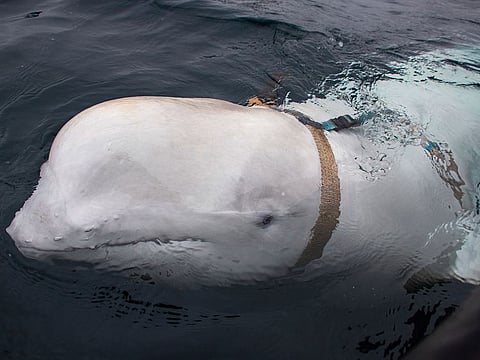Russian ‘spy whale’ caught as Norwegians spot something fishy
The beluga had previously approached other fishermen trying to rub the straps off

Moscow: Fishermen in northern Norway have found a beluga “spy whale” in a camera harness which scientists believe escaped from the Russian navy.
Three brothers were fishing off the island of Ingoya, not far from Norway’s Arctic border with Russia, last Thursday when a small white whale came up to their boat, apparently seeking help to remove the harness it was wearing.
The beluga had previously approached other fishermen trying to rub the straps off, the brothers told the Norwegian Broadcasting Corporation.
A fisheries service employee in a wetsuit was finally able to remove the harness in the water. The beluga then swam away. Photographs showed that “Equipment St Petersburg” was written on the buckle of the harness, which had an attachment to hold a GoPro camera.
If this comes from Russia, and there is good reason to believe it does, then it is not Russian scientists but rather the navy that has done this.Audun Rikardsen, a professor at the Norwegian Arctic University
The incident comes as Russia’s growing military activity in the Arctic raises concerns with Nato and its allies.
Audun Rikardsen, a professor at the Norwegian Arctic University, said he had contacted Russian colleagues, and neither Russian nor Norwegian scientists had put the harness on the whale.
“If this comes from Russia, and there is good reason to believe it does, then it is not Russian scientists but rather the navy that has done this,” Martin Biuw of the Institute of Marine Research told the Norwegian broadcaster.
“This is not a method scientists use, and as far as I know, Russian scientists do not tag beluga whales.”
A retired Russian general ridiculed the idea that the whale was engaged in spying as “Scandinavian paranoia”.
Wheres the logic?
“The Norwegians probably would have liked the ID of a GRU dolphin officer to be attached to it as well,” Viktor Baranets, a former army media officer, told the Govorit Moskva radio station. “We’re not idiots. If we were conducting reconnaissance with the help of this animal, how would we have done it? Written a mobile phone number on it to call in case something happens?”
But Mr Baranets also admitted that Russia had long possessed “combat dolphins” in Sevastopol able to complete tasks “from studying the sea floor to guarding harbours to destroying enemy infiltrators to attaching explosives to the hulls of foreign ships”. He was referring to a secretive military installation in Cossack Bay in Crimea that has been known to train belugas as well as dolphins.
The USSR began the combat dolphin programme during the Cold War, but after the Soviet collapse, the two dolphinariums at Cossack Bay fell on hard times, and one trainer took a beluga whale and other animals to Iran in 2000, complaining he had nothing to feed them in Ukraine.
The facility passed into Russian hands when Moscow annexed Crimea in 2014.
A journalist who tried to visit it the next year was not allowed on to the territory, but the programme has apparently expanded under Russian control: in 2016, the defence ministry announced a tender to purchase five dolphins.
Belugas and dolphins can complete tasks including submarine and mine hunting if trainers are able to turn them into a game for the naturally inquisitive and playful animals.
Sign up for the Daily Briefing
Get the latest news and updates straight to your inbox



